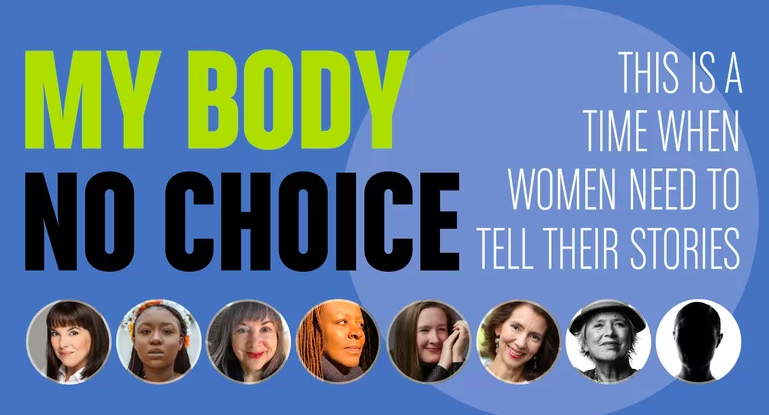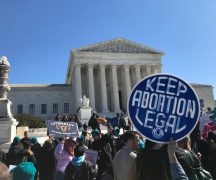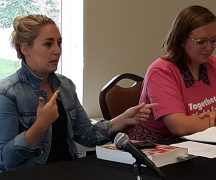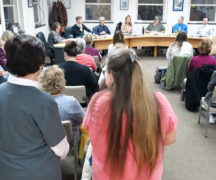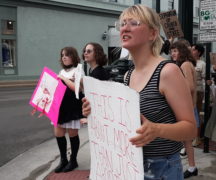By DAVID DUPONT
BG Independent News
Sara Lipinski Chambers, of the BGSU Department of Theatre and Film, already had a show in the works when she saw the message from the Arena Stage in Washington D.C.
In the wake of the U.S. Supreme Court’s decision to overturn Roe V. Wade, Molly Smith, Arena’s artistic director, commissioned eight leading female playwrights to respond to the threat to bodily choice. She was outraged by the decision, she told National Public Radio, as were others she knew. The result was “My Body No Choice,” a series of eight monologues, both fiction and non-fiction, all grounded in real stories.
The playwrights had agreed to make their work available to any theater company that could stage it before the mid-term elections.
“I thought that was something worth looking into,” Chambers said.
She spoke to Lesa Lockford, the chair of the department. Lockford agreed it was something they should do.
So, Chambers started pulling it together, shoehorning it in as she directed “The Harvest,” which completes its run on campus today (Oct. 30).
She recruited a cast of eight women to perform the monologues. One of them is Lockford. It’s a mix of students, faculty, and a community member.
Lockford said when they decided to produce it, she offered to be in the cast if that was appropriate – she didn’t want to take a spot away from a student.
On Wednesday, Nov. 2 at 7 p.m. the cast will offer a one-night only free performance of “My Body No Choice” in the Conrad Choral Room in the Wolfe Center for the Arts.
Though prompted by the abortion decision, that’s not its only focus, Chambers said.
Contributing writers are Lee Cataluna, Fatima Dyfan, Lisa Loomer, Dael Orlandersmith, Sarah Ruhl, Mary Hall Surface, V (formerly Eve Ensler), and a writer who choose to go by Anonymous to honor the women whose voices are not heard.
Molly Smith, longtime artistic director at Arena Stage, told NPR: “When Roe v. Wade was struck down, I was devastated, along with just about everyone I know. So, I contacted eight wonderful female writers and asked them each to write a monologue around choice.”
She said that the breakthrough in gay rights happened when people started telling their stories. “”I think what’s happened with abortion and reproduction is that for many, many years women have been silent. And I think now is really a time for women to speak out.”
The play, Chambers said, is not just about the freedom to choose an abortion. “It’s asking some important questions about the body.”
“My Body No Choice” also addresses medical care that extends life, choosing the size of one’s body, whether to have gender affirming surgery, and “whom we share our body and how it happens,” Chambers said.
In one monologue the speaker addresses feeling shamed by having a larger body, and she gains weights after each pregnancy
Hawaiian writer Lee Cataluna talks about her mother and her views about the female body. She told her daughters that having sex with multiple men causes wrinkles. Her skin was smooth, but she was concerned about some of her friends. She praised her daughter, who after a difficult pregnancy decided to have a baby against medical advice. In the end of her life, the mother decided to stop getting chemotherapy.
“I wish the debates were not framed only on the abortion issue,” Lockford said. This misses the scope of issues affected by overturning Roe v. Wade
No one, she said, is for abortion “We’re talking about bodily integrity to make decisions for your own life. That is essential.”
Other issues including gay marriage and other LBGTQ+ rights “are up for grabs” after the Dobbs v. Jackson ruling, she said.
“I don’t think the script is attempting to give any definitive answers,” Chambers said.
Lockford reads the monologue written by the playwright V, formerly known as Eve Ensler, who created “The Vagina Monologues.”
The speaker in the monologue had “a childhood of severe abuse, and she eventually ends up pregnant because she goes off the rails and gets pregnant and wants to have an abortion and does,” she said. “The whole idea of having a child is anathema to her having been a battered, sexually abused baby.”
Lockford understands that staging the play may be controversial. “Does it mean we should shy away from doing it? No,” she said. As a public institution the department should provide a venue for airing these issues.
She added: “Our job as theater professionals isn’t just to entertain. … It’s not just to reflect the society, but to have a sounding board about and possibly influence the world.”
As to those who disagree with the play’s message, Lockford said: “I want them all to come.”

